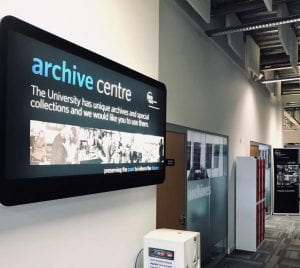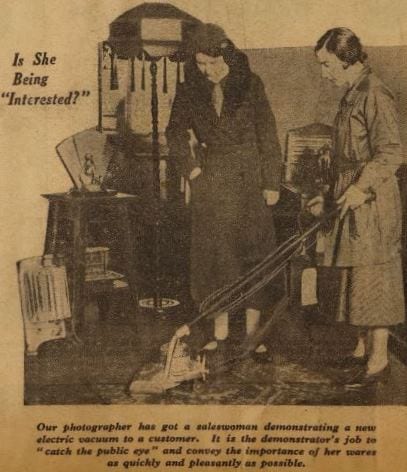Category Archives: Archives and Special Collections
What we do
My brother is getting married this weekend, and along with revising my best man speech (gulp), I’m also anticipating a lot of relatives and newly minted in-laws asking the perennial question; what is it you do again?

GCU Archive Centre reading room
As ever, I’ll smile and reply that I work as an archive assistant. They’ll nod, pause and then ask, but what do you do? And that’s where it gets tricky.
Getting social in the archives
The life of a project archivist can sometimes be quite isolated. You can spend hours on your own in the archives arranging and cataloguing records. But sometimes a project comes along where you get to interact more with people, as I have discovered working on the Social Enterprise Collection (Scotland).

Working on records in the Archive Centre
Glasgow Caledonian University (GCU) Archive Centre holds the Social Enterprise Collection (Scotland) which is a national archive of records from organisations and individuals involved in the social enterprise movement across Scotland. Continue reading
A stitch in time: the story of a D-Day flag
The Glasgow and West of Scotland College of Domestic Science (affectionately known as the ‘Dough School’) may not immediately come to mind when one thinks of D-Day. Yet in the form of the flag carried into battle by the 308 Battery 128th (Highland) Field Regiment, Royal Artillery 51st Division, the College was represented.
Summer shelving project
Big changes are coming to the library this summer, making it easier for our students and staff to find the books and journals they’re looking for.
In response to student feedback, the mobile shelving on levels two, three and four of the Saltire Centre will be converted to static shelving. The books and journals currently held on the mobile and existing static shelves will also be integrated, meaning library users will no longer have to go to different sets of shelves to see all of the material on any one subject.
Robert Ruthven, Director of Library Services, said: “Our students have told us that they find the mobile shelving off-putting and difficult to use. This is also reflected in the low usage of the material that’s held in this shelving.
“We’re, therefore, moving these books and journals to static shelving, meaning the material that’s currently ‘hidden’ in the mobile shelving will be easy to find by users as they browse.
“This is a huge project for the library, which involves moving almost every book and journal in our collection.”
The work will be carried out over the summer months, which is typically a quieter period for the library.
To keep disruption to a minimum, work will be carried out on one floor at a time, starting on level four in May, after the exams have ended. Each floor will be closed and the material held on that floor will be unavailable to users for about four weeks while the work progresses. The work is due to be complete by early August.
Robert said: “To give our users as much access to our physical collection as possible, we’re encouraging them to borrow early in advance of the floor closures. We will not charge fines on items borrowed over the summer period and we’re investing in additional e-books. Our inter-library loan service is also available to all students and staff.”
The mobile shelving on Level 0 of the Saltire Centre will not be converted to static shelving. Instead, its electronic-management system will be upgraded and it will be used to house low-use items that have not been borrowed for more than ten years. At the end of the project this material will be available on request and will be fetched by library staff.
The mobile shelving in our Archives Centre, which holds the University’s archives and special collections, is also being upgraded to securely house these resources for many years to come.
Gifts that keep on giving
To meet someone gifting to the Archive Centre is (at least for this writer) in parts agreeable, humbling, and slightly nerve-inducing – exacerbated manifold if the materials are of personal or sentimental value.
The neatly folded and dry-cleaned blazer which Doreen Blanche brought to the reading room had belonged to her late mother and was the first of its kind received to Glasgow Caledonian University Archive Centre. Pale blue with purple stripes, it was worn by students of the Glasgow and West of Scotland College of Domestic Science – colloquially and affectionately referred to as the ‘Dough School’. Later renamed The Queen’s College, Glasgow, it is a founding institution of GCU.
Want to know more about GCU’s history – read on…
A Wellcome Trust Research Resources Project
Our Wellcome Trust Research Resources funded project “Poverty, Health, Diet and Education in Glasgow: from Domestic Science to the Allied Health Professions, 1875-1993” is now finished. With its completion comes three comprehensive online catalogues, a glimpse into the archives via a new online exhibition and a set of blogs and tweets built up over a one year period. The door is now open for you to delve in and better understand the amazing story of one strand of our founding institutions. Continue reading
Banner Tales – Glasgow and the Anti-Apartheid Movement – 13th October 2018
On a rainy Saturday afternoon stands were assembled, banners unfurled and hung. Pencils sharpened and leaflets laid. All in preparation for the attendees, as they arrived to mellifluous South African music that melded soon with memories regaled.
This was Banner Tales, an event organised by Glasgow Museums, Glasgow University Geography Department, Glasgow Caledonian University Archive Centre, ACTSA Scotland and Nelson Mandela Scottish Memorial Foundation with the support of the Raphael Samuel History Centre. The two banners under discussion were from the Scottish Anti-Apartheid Archive held in GCU Archive Centre and Glasgow Life. Each authentic to the time period and rich in colour and history.
One of many events throughout October as part of Black History Month, it also coincided with the week of the 25th anniversary of Nelson Mandela’s visit to Glasgow on the 9th of October 1993 to receive the freedom of nine cities.
What’s in a name? Royal connection of the Queen’s College, Glasgow
A Wellcome Trust Research Resources Project

It was during its centenary year in 1975 that the College received its royal title, the Queen’s College, Glasgow. Before that it was called the Glasgow and West of Scotland College of Domestic Science (Incorporated), a name dating back to 1908 when the two Glasgow cookery schools amalgamated to form the College. At that time it described very precisely (if not concisely) the function of the College, but after the passage of sixty seven years the name no longer fitted its purpose. Continue reading
Electrifying Domestic Science – guest blog by Eleanor Peters
Eleanor Peters is a University of Aberdeen PhD student. She has been using the Queen’s College, Glasgow (formerly the Glasgow and West of Scotland College of Domestic Science) records, which are in the final stages of being catalogued as part of the Wellcome Trust Research Resources Project. Many thanks to Eleanor for sharing the fascinating information she has found from the records. I wonder what other areas of research the catalogue will unlock when it goes live later this year. (KM)
Over the last year, I have had the pleasure of visiting the Glasgow Caledonian University (GCU) archive several times to carry out research for my PhD. As a part-time research student in the second year of my studies, my thesis is still very much ‘taking shape’; however, it was the records for the Glasgow and West of Scotland College of Domestic Science (GWSCDS) which inspired the subject matter of my PhD: Electricity and Domestic Science Institutes in Scotland and England c.1910-1939.

Demonstrating an electric vacuum cleaner, Newspaper cutting February 1934.
Women played an integral role in promoting the uptake of gas appliances in Britain in the late 1800s; large audiences gathered to watch female appliance demonstrators (also known as ‘Lady Demons’!) cook using gas stoves.[1] I wondered if women had also played an active role in demonstrating electrical appliances; being a student at the University of Aberdeen, I naturally turned my attentions to electrical appliance demonstrations in Scotland first. Continue reading
